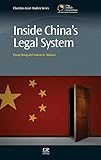Inside China's legal system / Chang Wang and Nathan H. Madson.
Material type: TextSeries: Chandos Asian StudiesPublication details: Philadelphia, PA : Chandos Publishing, an imprint of Woodhead Publishing., 2013.Description: xxxv, 353p. ; 24cmContent type:
TextSeries: Chandos Asian StudiesPublication details: Philadelphia, PA : Chandos Publishing, an imprint of Woodhead Publishing., 2013.Description: xxxv, 353p. ; 24cmContent type: - text
- unmediated
- volume
- 9780857094605
- 349.51 WAN
| Item type | Current library | Call number | Status | Date due | Barcode | Item holds | |
|---|---|---|---|---|---|---|---|
 Book
Book
|
Calcutta | 349.51 WAN (Browse shelf(Opens below)) | Available | IIMC-141989 |
Browsing Calcutta shelves Close shelf browser (Hides shelf browser)

|

|

|

|
No cover image available |

|

|
||
| 349.5 JAY Law, capitalism and power in Asia : | 349.5 MAC Law and development in Asia / | 349.51 FOL Law in the people's republic of China : | 349.51 WAN Inside China's legal system / | 349.54 AGR Public interest litigation in India / | 349.54 BAX Dimensions of law : | 349.54 BAX The Crisis of the Indian legal system / |
This book provides readers with a comprehensive look at the system including how it works in practice, theoretical and historical underpinnings, and how it might evolve. The first part of the book explains the Communist Party's utilitarian approach to law: rule by law. The second part discusses Confucian and Legalist views on morality, law and punishment, and the influence such traditional Chinese thinking has on contemporary Chinese law. The third part focuses on the roles of key players (including judges, prosecutors, lawyers, and legal academics) in the Chinese legal system. The fourth part offers Chinese legal case studies in civil, criminal, administrative, and international law. The book concludes with a comparison of China's fundamental governing and legal principles with those of the United States, in such areas as checks and balances, separation of powers, and due process.
There are no comments on this title.

